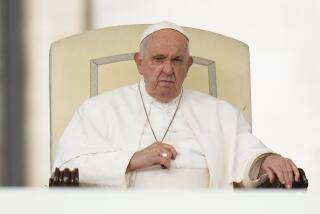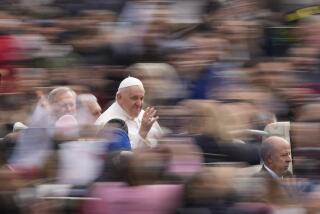Popeâs Visit to Poland Colored by Political, Personal Themes
WARSAW â Pope John Paul II today begins his fifth and longest pilgrimage to his native Poland, a highly anticipated journey likely to be marked by religious, political and personal drama.
The pontiff starts the 11-day visit in the southwestern city of Wroclaw, where an estimated 1 million pilgrims have been gathering at a world congress of Roman Catholics and other Christians. He will also meet the presidents of seven Eastern European countries in Gniezno, in west-central Poland, and later he will pray at the tomb of his parents in the southern city of Krakow.
Although it has not been officially stated, many Poles expect this will be the ailing popeâs farewell tour of his homeland, giving it an unusually sentimental character in a country where the former Cardinal Karol Wojtyla is revered as both a religious leader and a national hero.
BACKGROUND: As in his previous pilgrimages here--beginning in 1979, with the first visit of a pope to a Communist country--the pontiff returns to a home racked by political and religious tensions and openly anxious about how his presence will play out.
Although many of the church-state divisions in Poland are familiar, the pope now presides over an institution that has largely exhausted its Communist-era role as the sentimental favorite among the countryâs 38 million residents, more than 90% of whom are at least nominally Roman Catholic.
Since the pontiffâs last pilgrimage here six years ago, the church has stumbled in its search for a meaningful niche in democratic Poland, where Sunday Masses are crowded but most Poles say they do not want priests interfering in politics or their daily lives. Without a Communist boogeyman to rail against, squabbles among church officials have publicly surfaced, and churchgoers have become less willing to swallow unpalatable dogma.
ISSUES: Many of the names, titles and affiliations change, but the showdown in Polish politics has been essentially the same in the popeâs nearly two-decade reign: believers versus nonbelievers. And since leaving Poland for Rome, the worldâs first Polish pope has remained a key player in the high drama back home.
Just a year after his historic 1979 visit, mass protests led to the formation of the church-backed Solidarity trade union movement, which ultimately toppled communism here. Although the Communists are gone, their successors--now known as Social Democrats--have ruled Poland for nearly four years and have become the churchâs No. 1 enemy.
To the popeâs chagrin and anguish, the former Communists have liberalized the countryâs abortion law--although the Supreme Court struck it down this week--delayed ratification of a concordat with the Vatican and passed a new constitution that critics say gives the Catholic Church short shrift.
Political groups associated with Solidarity are hoping the pontiffâs visit, coming just four months before expected parliamentary elections, will give the erstwhile anti-Communist opposition a moral advantage. To capitalize on the popeâs popularity, Solidarity Election Action, an alliance of more than 30 parties and groups, has printed thousands of posters featuring his picture and its logo.
FORECAST: Polish church officials say it is unlikely the pope will directly enter the political fray, but it will be impossible for him to conceal his dissatisfaction with the countryâs post-Communist moral drift.
Although Polandâs economic transformation has been phenomenal, the aging pontiff had high hopes for a spiritual renaissance as well.
âI think he has the right to be disappointed, especially when you are someone who wants and expects change immediately,â said Bishop Tadeusz Pieronek, general secretary of the Polish episcopate. âFor someone whose life is to a large extent behind him, his urgent longing for a different society here is understandable.â
Some analysts say the pope may also step on the toes of his nationalist admirers by stressing the importance of cooperation with neighboring Germany and the rest of Europe.
More to Read
Sign up for Essential California
The most important California stories and recommendations in your inbox every morning.
You may occasionally receive promotional content from the Los Angeles Times.










